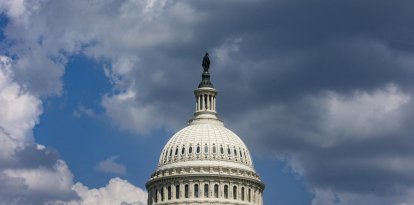Faithless elector: the ultimate risk for candidates
Although it is not common, and most states have laws to prevent it, on as many as 90 occasions a voter voted against his or her party's nominee. The last time, in 2016, when 8 Democrats and 2 Republicans rejected Clinton and Trump.

In 1824, none of the candidates reached 270 electors to claim victory
Electors hold a crucial role in the American electoral system, as they have the final say in choosing the president. Although it is considered a mere formality, since they are chosen by the parties and the ballot boxes determine how many of each will deposit the name of a candidate in the electoral college, on as many as 90 occasions they have voted for a different candidate, which is known as a faithless elector. The last case, in 2016, when eight Democrats rejected Hillary Clinton and two Republicans rejected Donald Trump. In an election as polarized and evenly matched as this one, the possibility that a voter decides to betray his or her political formation can mean the triumph of the adversary.
Faithless voting does not mean voting for the rival candidate, something that has happened only once, in 1796, when Pennsylvania Federalist Samuel Miles chose to elect Thomas Jefferson over John Addams. On most occasions, however, the name of a third person who was not opting for the office has been included. In any case, this is an unusual situation, which has never been decisive for the election of a president.
As many as 63 faithless electors in 1872, 10 in 2016
In fact, it has only occurred in 90 - mostly Democrats - of the 23,507 electoral votes cast in the 58 presidential elections held so far. Notably, 63 of them came in the same year, in 1872, because of the death of Democratic candidate Horace Greeley the day after the election. Greeley garnered 66 delegates, of whom three kept his name - his vote was considered invalid - and the remaining 63 were split: 42 for independent Thomas Hendricks; 18 for Greeley's ticket mate, B. Gratz Brown; two for fellow Democrat Thomas Jenkins and the last for David Davis, also of the Blue Party.
The second occasion with the highest number of faithless electors occurred in 2016, when 10 electors broke with their party line. Particularly vociferous was the case of Texas Republican electors Chris Suprun (who voted for John Kasich) and Bill Greene (Ron Paul), as well as the resignation of fellow Texan Art Sisneros before the vote, who was replaced.
However, it was the Democratic Party that experienced a mass desertion. As many as eight electors went for other politicians instead of Clinton. This was the case of David Bright (Maine - Bernie Sanders); Muhammad Abdurrahman (Minnesota - Bernie Sanders); Micheal Baca (Colorado - John Kasich); Esther John (Washington - Colin Powell); Levi Guerra (Washington - Colin Powell), Bret Chiafalo (Washington - Colin Powell); Robert Satiacum (Washington - Faith Spotted Eagle); and David Mulinix (Hawaii - Bernie Sanders).
How do states combat faithless compromisers?
Given that the national electoral system is, de facto, 50 electoral systems, in which each state has virtually total freedom to do as it sees fit, there are different formulas for dealing with this phenomenon. In 12 states there are no specific laws on faithless electors, while the other 37, and Washington D.C., require electors to vote for the pledged candidate. A measure upheld by the Supreme Court in 2020, in the case Chiafalo v. Washington, in which it confirmed that states have the right to require pledges and penalize or nullify deviant votes.
Among these 38 cases there is disparity in the measures. In 15 of them, such as Alaska, Hawaii and Wisconsin, an elector is prohibited from voting for a candidate other than the one chosen by his or her voters. In the rest, not only is it prohibited, but the vote of that compromiser is nullified. In addition, 10 (California, Illinois, Indiana, Minnesota, Montana, Nebraska, Nevada, North Dakota, Tennessee, and Washington) have passed the Uniform Faithful Presidential Electors Act, which provides for the replacement of an elector who betrays his or her party and the choice of its voters.
On 75 occasions a vice president was voted off the party ticket
Finally, faithless electors have not been limited to only presidents. On as many as 75 occasions, a vice-president other than the one on his party's election ticket has been voted for.

























